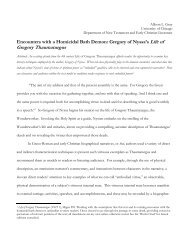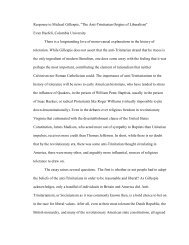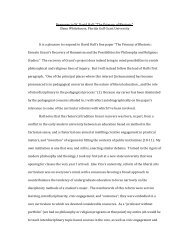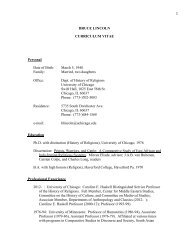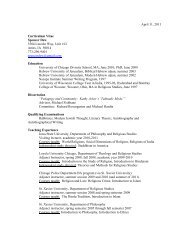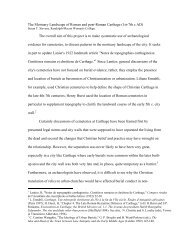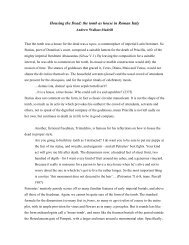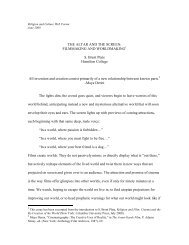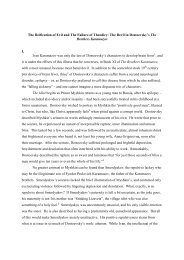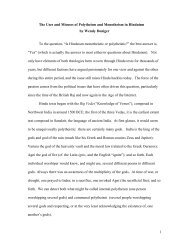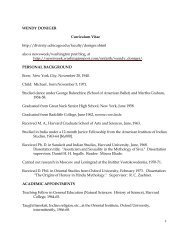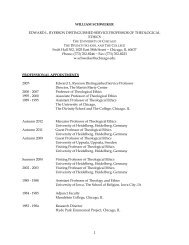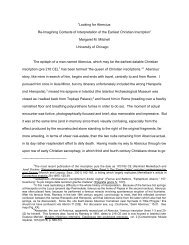*Criterion Winter 02-4.16 - Divinity School - University of Chicago
*Criterion Winter 02-4.16 - Divinity School - University of Chicago
*Criterion Winter 02-4.16 - Divinity School - University of Chicago
You also want an ePaper? Increase the reach of your titles
YUMPU automatically turns print PDFs into web optimized ePapers that Google loves.
26 WINTER 20<strong>02</strong><br />
THE DEAN’S FORUM ON<br />
THE BEDTRICK<br />
TALES OF SEX AND MASQUERADE<br />
ach quarter at a Wednesday luncheon, the Dean convenes several colleagues from different areas<br />
<strong>of</strong> study to discuss a recent faculty work. Last spring, the Forum brought historian <strong>of</strong> religions<br />
Wendy Doniger and political philosopher Jean Elshtain into discussion over Pr<strong>of</strong>essor Doniger’s<br />
book The Bedtrick: Tales <strong>of</strong> Sex and Masquerade (<strong>University</strong> <strong>of</strong> <strong>Chicago</strong> Press, 2000).<br />
COMMENTARY<br />
Jean Bethke Elshtain<br />
Like its author, The Bedtrick: Tales <strong>of</strong> Sex and Masquerade is<br />
complex, fascinating, and full <strong>of</strong> pizzazz. I confess that I am<br />
relieved Pr<strong>of</strong>essor Doniger’s friend Pr<strong>of</strong>essor David Grene<br />
convinced her that no one would read a two-thousand-page<br />
book! Having just completed a behemoth volume <strong>of</strong> my<br />
own, I am now advised by my publisher that no one nowadays<br />
wants to read an eight-hundred-page book, so I am<br />
going through the agony <strong>of</strong> slicing and dicing <strong>of</strong>f at least two<br />
hundred pages. I mention this because it is a preliminary to<br />
a confession, namely, that I accepted Pr<strong>of</strong>essor Doniger’s<br />
gracious invitation to do some skipping about. She writes:<br />
“Readers impatient with this agenda”—which I will note in<br />
a moment—“and those who want to cut to the chase to find<br />
out why they should bother to read the stories at all, can<br />
always skip to the conclusions <strong>of</strong> each chapter, then to the<br />
sections on approaches, and finally to the summary conclusion<br />
<strong>of</strong> the book.” My problem was not impatience, but time,<br />
so I did do quite a bit <strong>of</strong> skipping, then backtracking, then<br />
moving forward again. But the stories are so wonderful and so<br />
wonderfully told by Pr<strong>of</strong>essor Doniger that The Bedtrick in its<br />
entirety is primus inter pares on my list <strong>of</strong> summer reading.<br />
The devil is in the details here and the details are delightful.<br />
Pr<strong>of</strong>essor Doniger explains her subject matter and approach<br />
in her preface. She tells us that The Bedtrick is about sex—not<br />
gender, specifically lying about sex and telling the difference,<br />
or not, as the case may be. This I found refreshing because<br />
most <strong>of</strong> the literature I read has so subsumed sex into gender<br />
that it loses sight <strong>of</strong> embodiment. One is presented with an<br />
overly socialized human subject—one entirely constructed as<br />
if our bodies are mere appendages (à la Descartes) or nuisances<br />
(à la my mother).<br />
Doniger’s book is about mythology, not social theory—<br />
though there is some <strong>of</strong> that; not theology—though there is<br />
some <strong>of</strong> that; not literary theory—though there is some <strong>of</strong><br />
that; not psychoanalysis—though there is some <strong>of</strong> that, and<br />
so on. She is interested in doubles, shadows, and masquerades;<br />
in poems, novels, and treatises; in jingles, operas, and serenades;<br />
in cartoons and Hollywood B movies, which further endeared<br />
her to my heart as I, too, am a fan <strong>of</strong> wonderful, bad Hollywood<br />
stuff. In her words: “. . . this book regards the entire<br />
world as its oyster and utilizes the irritating grains <strong>of</strong> sand<br />
consisting <strong>of</strong> a number <strong>of</strong> different methods to extract the<br />
string <strong>of</strong> narrative pearls.” This puts me in mind <strong>of</strong> the great<br />
Hannah Arendt, who when asked to describe her approach<br />
or method—a word she rather disliked—charmingly dubbed<br />
it “pearl fishing.” One dives in, she said, not knowing quite<br />
what one will come up with. The important point is to<br />
remain open to one’s subject matter, to see where it is going,<br />
This Dean’s Forum took place on May 23, 2001, at a<br />
Wednesday lunch in Swift Common Room.




